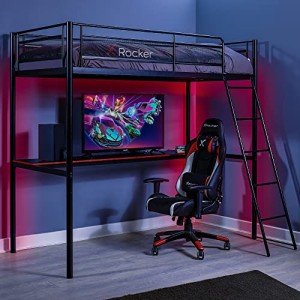10 Tips For Getting The Most Value From Bunk Beds For Kids

Bunk Beds for Kids: A Comprehensive Guide
Bunk beds have actually been a popular choice for kids's bedrooms for years. They provide a space-saving solution that makes the most of floor location, offers fun climbing up options, and comes in a variety of styles that interest children's creativities. This short article explores the advantages, factors to consider, designs, and security functions related to bunk beds for kids.
Advantages of Bunk Beds
Bunk beds present numerous benefits that make them an attractive option for families. Here are some key benefits:
Space Saving
- Bunk beds enable two or more children to share a room without sacrificing space for play or other activities.
Cost-Effective
- Buying a single bunk bed can be more cost-effective than buying two separate beds.
Fun Factor
- Kids typically see bunk beds as an enjoyable location to sleep and play, fostering a sense of experience.
Flexibility
- Bunk beds are available in numerous setups, consisting of L-shaped, loft beds, and even convertible designs that can alter as kids grow.
Organization
- Many bunk beds include integrated storage alternatives, such as shelves and drawers, helping keep spaces arranged.
Key Considerations Before Purchasing
Before purchasing a bunk bed, it's important to think about certain factors, such as:
- Space Requirements
Step the room to ensure that there is enough vertical space, enabling sufficient headroom on the top bunk. - Age of Your Children
Consider their age and maturity. Many manufacturers suggest that kids under 6 need to not sleep in the leading bunk due to safety issues. - Weight Limit
It's crucial to examine the weight limitations of the bunk bed for both the leading and bottom bunks to guarantee security. - Style Preferences
Select a design that matches the space's design and the kids's choices. - Material
Bunk beds are offered in various materials, such as wood or metal. Each has its advantages and drawbacks concerning durability and aesthetic appeals.
Styles of Bunk Beds
Bunk beds come in different styles to fit various looks and functional needs. Here's a list of some popular designs:
- Standard Bunk Beds
Traditional stacked beds that include 2 beds built one above the other. - Loft Beds
A bed raised high off the ground, with space underneath for a desk, play area, or storage. - L-Shaped Bunk Beds
2 beds arranged in an L-shape, offering more flooring space and a special style component. - Twin Over Full Bunk Beds
These options feature a twin bed on leading and a full-sized bed on the bottom, accommodating older children or adults. - Triple Bunk Beds
Created for three children, these beds usually consist of 3 stacked beds, perfect for larger households.
Safety Features to Consider
Guaranteeing the safety of children utilizing bunk beds is vital. Here are some safety includes to look for before making a purchase:
- Guardrails
A bunk bed need to consist of sturdy guardrails on the top bunk to avoid unintentional falls. - Ladders
Guarantee that the ladder is safely connected and easy for kids to browse safely. - Stability
Try to find bunk beds with lower center of mass and large bases to supply better stability. - Quality Construction
Pick beds made from long lasting materials that meet security requirements, such as ASTM (American Society for Testing and Materials) policies.
Frequently Asked Questions About Bunk Beds
1. What age is suitable for a leading bunk?Generally, kids aged 6 and older are recommended for oversleeping the leading bunk. 2. Are bunk beds safe for toddlers?Most experts recommend versus
positioning young children in the top bunk due to the
risk of falls and improper ladder use. 3. Can bunk beds be separated?Many bunk beds are created to be separated into 2 standalone beds,
providing included flexibility as children grow
. 4. How do Bunk Beds For Teens sylviaconway.top preserve a bunk bed?Regularly look for loose screws and use, keep bed mattress clean, and guarantee that the bunk bed is
stable to extend its life expectancy. 5.
Exist any unique mattress requirements for bunk beds?Yes, bed mattress for bunk beds need to fit comfortably without leaving spaces. Normally, thinner mattresses
(around 6 to 8 inches )are recommended for leading bunks for security. Bunk beds provide a flexible, useful, and fun service for children's sleeping arrangements, maximizing space while accommodating several kids in one space. By thinking about the essential factors
of design, security, and space, parents can make an informed decision when picking the ideal bunk bed for their children's requirements. With the right care and upkeep, a bunk bed can be a beloved furniture piece that provides years of usage and enjoyment for children. Summary Table of Bunk Bed Styles Style Description Best For Requirement Bunk Beds Traditional design, two stacked beds Smaller rooms Loft Beds Elevated bed with open space underneath Study or play locations L-Shaped Bunk Beds Two beds in an L-shape
Added floor space Twin Over Full Twin on leading,
| complete on bottom Accommodating older children Triple | ||||||
|---|---|---|---|---|---|---|
| Bunk Beds | 3 stacked beds | Larger families By understanding | the numerous alternatives offered, designated considerations for security and functionality, and appropriate age standards, households | can select the ideal bunk bed that not | just boosts their living space | however also ensures a safe and |
| satisfying sleeping environment | for their children.

|
